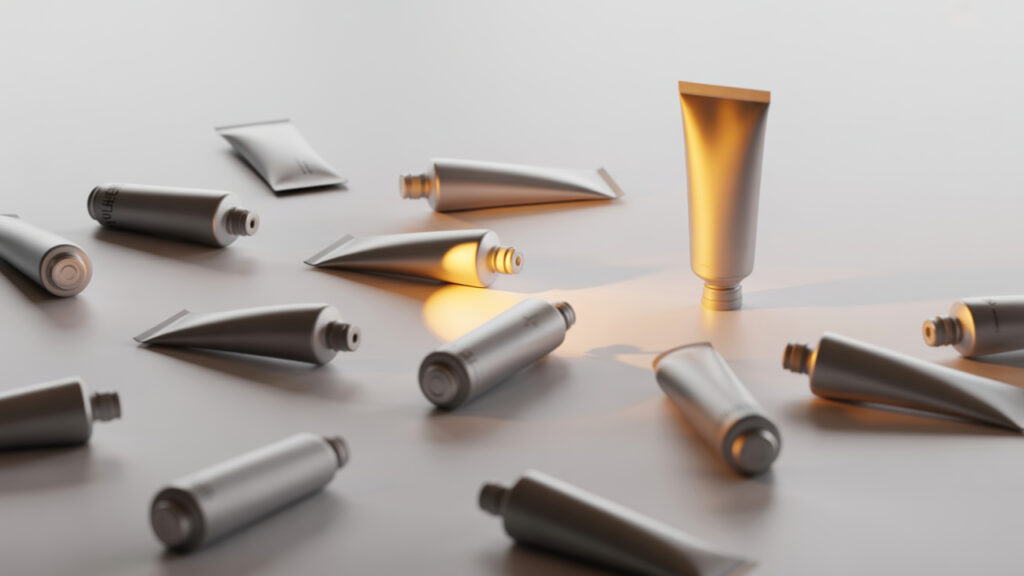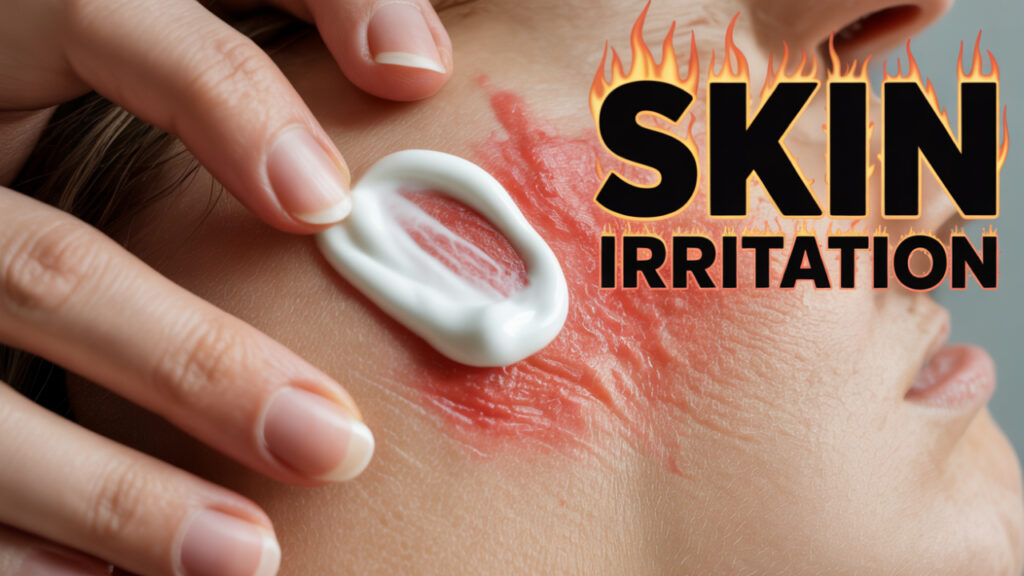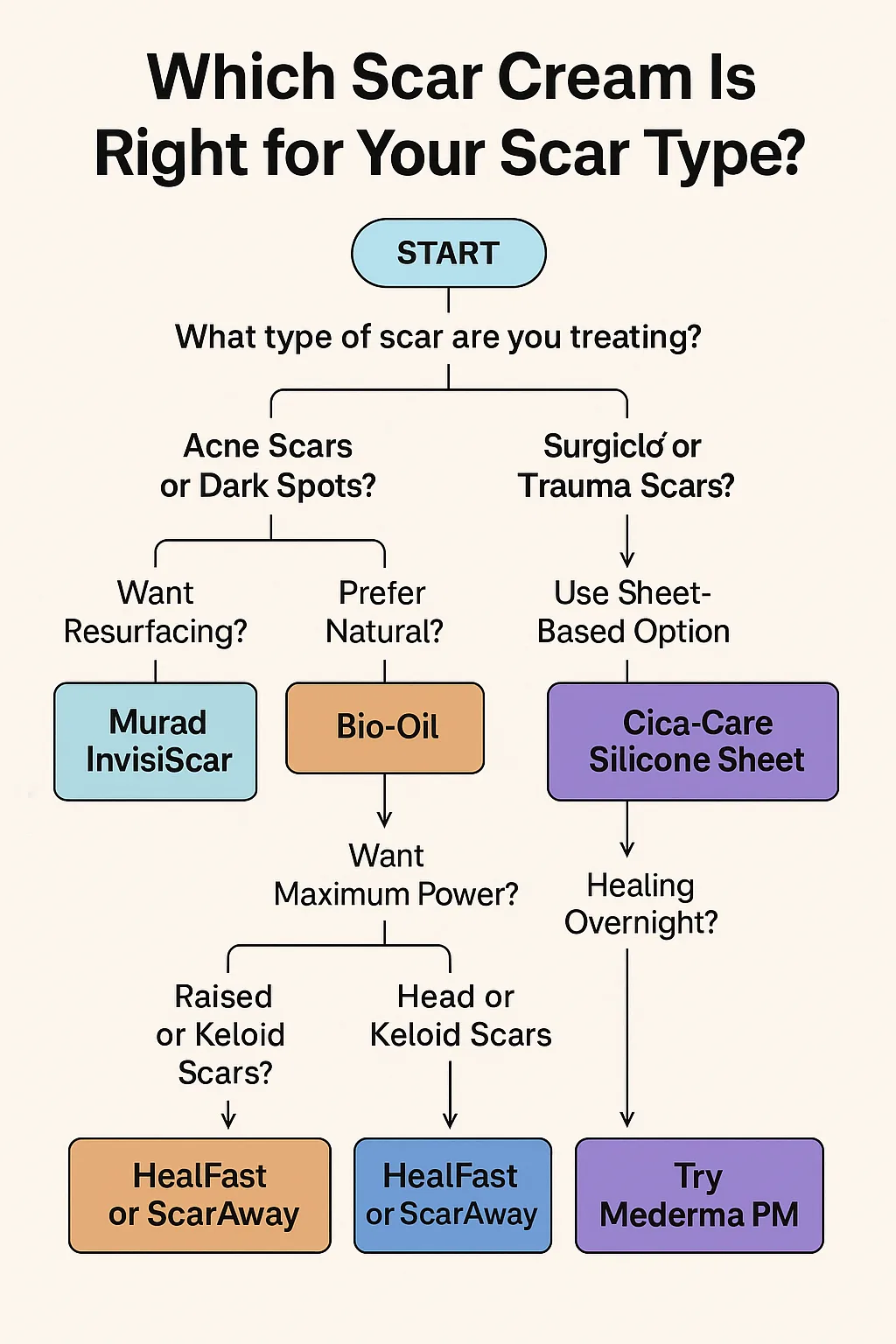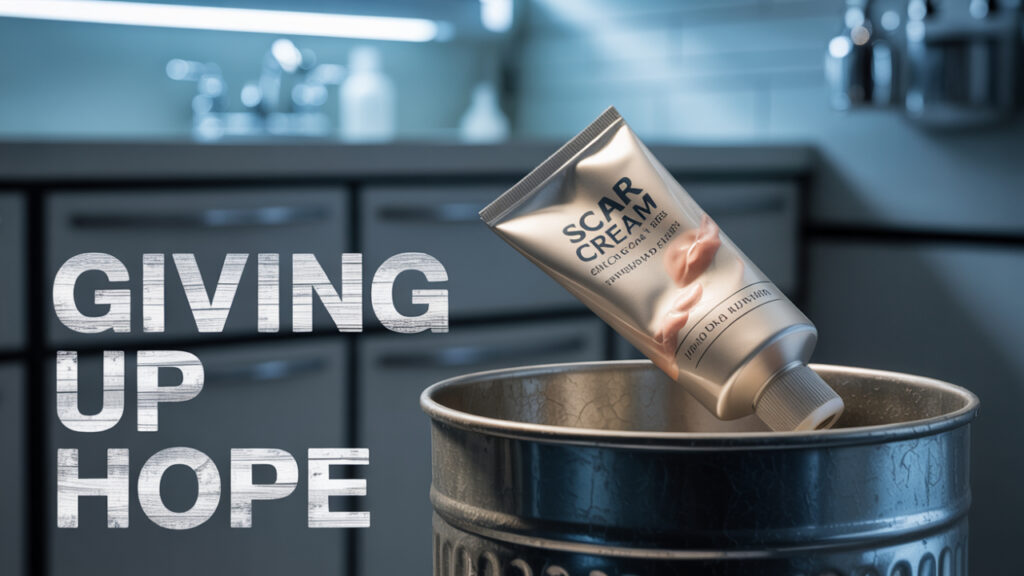Published on May 19, 2025 • Last Updated on May 22, 2025
Imagine waking up to flawless skin… only to catch a glimpse of that old scar staring back at you in the mirror. It’s a reminder — of surgery, acne, or maybe something much worse.
We’ve all been told that “nothing really works on scars.” But what if that’s just not true?
Because the latest scar treatments? They don’t just fade the past — they erase it.
And that’s just the beginning.
⚡ TL;DR
- Most “scar creams” don’t penetrate deep enough to work — but these ones do
- The #1 cream uses a clinical-grade ingredient once reserved for burn victims
- Natural doesn’t always mean better — some “organic” options can actually slow healing
- And the product that works fastest? It’s probably not the one you think
🧴Scar Creams That Actually Work — And How to Choose One Without Wasting Money

Choosing the right scar treatment in a sea of overpriced serums, cheap knockoffs, and overhyped “miracle balms” isn’t just confusing — it’s overwhelming.
Some promise overnight results. Others? Barely moisturize.
But here’s the truth:
If you don’t match the cream to your type of scar, you might be making it worse.
Let’s break down what actually matters 👇
What to Look For (Before You Regret It)
Here are the must-know features every smart buyer should scan for:
Scar Type Compatibility
Different products target different scars:
- Raised keloids
- Pitted acne scars
- Post-surgery lines
- Burn scars
- Hyperpigmentation
If the cream isn’t formulated for your scar type, it might do nothing at all.
Absorption Depth
Many creams just sit on top of the skin.
Look for multi-layer delivery systems that absorb down to the dermal layer — where scars actually form.
Clinically Proven Ingredients
Don’t fall for fluff. Instead, look for:
- Cepalin (onion extract, but highly refined)
- Pentavitin or Hydroxyprolisilane C
- Vitamin C + Silicone combo
- Allantoin, Panthenol, or Niacinamide
These aren’t buzzwords — they’re backed by peer-reviewed clinical data.
Non-Irritating Formulas
Avoid products with:
- Heavy fragrance
- Drying alcohols
- Essential oils (can be reactive on healing skin)
Even “natural” creams can inflame sensitive tissue.
Realistic Timeline
Look for brands that don’t claim results in 24 hours.
Healing takes time — usually 4–12 weeks, depending on the scar.
Miss this one detail… and you might end up spending $40 on a glorified lotion.
⚠️Don’t Do This to Your Skin — Common Scar Cream Mistakes Most People Make

Think you’re applying your scar cream correctly?
You might be sabotaging your own healing without even realizing it.
Let’s expose the biggest mistakes — including one that could permanently darken your scar.
Rubbing Too Hard
Scar tissue is fragile and easily inflamed.
Rubbing the cream in like you’re polishing a shoe? That creates microtears, delays healing, and can worsen discoloration.
Instead, pat gently and let the product absorb naturally.
Using the Wrong Cream for Your Scar Type
A keloid needs silicone sheets or barrier-forming gels.
An acne scar may benefit more from retinoids or vitamin C.
Using a generic “scar cream” for everything? That’s like using sunscreen to treat a sunburn — too late and totally ineffective.
Applying Too Early or Too Late
If you apply before the wound fully closes, you risk infection.
But wait too long — and the scar may have fully matured, making reversal much harder.
Ideal window: Once the skin has healed over, but while the scar is still pink or active.
Falling for “Natural” = Safe
Many people believe essential oils and herbal creams are better because they’re “natural.”
But lavender, citrus oils, and even aloe vera can cause irritation, contact dermatitis, or phototoxic reactions on healing skin.
“Natural” isn’t always gentle. And “gentle” isn’t always effective.
Quitting Too Soon
Scar healing is slow. Like, slower-than-watching-paint-dry slow.
Many users stop applying after 1–2 weeks and say it “didn’t work.”
But real results? They often take at least 4–6 weeks, sometimes longer.
And the next mistake? It’s one most dermatologists beg patients to stop doing…
📺Why Most Scar Creams Fail (And What Actually Works)
Ever wondered why some scar creams seem to do nothing — even after months of daily use?
Dermatologists have a brutally honest answer, and it’s not what most brands want you to hear.
Now that you know what to avoid — scroll down to see the few scar treatments that actually stand up to science.
📊 Scar Cream Showdown — Which Ones Actually Deliver?
Not all scar creams are created equal — and some do way more harm than good.
Use this quick comparison to see which ones fit your skin, your scars, and your budget.
| 📦 Product Name | ⭐ Best Feature | 🧪 Key Ingredients | 💰 Price Range | 📍 Application Area | 😎 Best For |
|---|---|---|---|---|---|
| Dermefface FX 7™ | Clinically proven for all scars | Symglucan, Pentavitin | $$$ | Body & face | All scar types |
| Mederma PM | Works overnight while you sleep | Cepalin (onion extract) | $$ | Face & body | Nighttime users |
| Bio-Oil | Fades both scars & stretch marks | PurCellin Oil™, Vitamin A & E | $$ | Face, body, stretch marks | Stretch marks + scars combo |
| Cica-Care Silicone Sheet | Flattens keloids over time | Medical silicone | $$ | Body (flat areas) | Keloids & hypertrophic scars |
| HealFast Gel | Medical-grade silicone formula | Crosspolymer Silicone | $$ | All areas incl. surgical | Post-op patients |
| ScarAway Gel | OTC with clinical silicone base | Medical Silicone | $$ | Face & body | Everyday OTC use |
| SkinMedica | DNA-level recovery with Centelline™ | Centelline™, botanical blend | $$$$ | Post-surgical zones | Surgical & trauma recovery |
| Murad InvisiScar | Brightens + smooths acne scarring | Salicylic acid, Vitamin C | $$$ | Face (post-acne) | Oily/acne-prone skin |
| RescueMD DNA Complex | Patented DNA repair enzymes | DNA enzymes, antioxidants | $$$$ | Face/body (post-procedure) | Laser/cosmetic healing |
| Derma E Scar Gel | Natural + vegan, non-silicone | Panthenol, Allantoin | $ | Face & body | Sensitive, natural skincare users |
🥇 Best Picks by Category
Not all scars — or scar sufferers — are created equal.
Some need a gentle fade for post-acne marks. Others want to flatten surgical keloids or brighten deep discoloration from years ago.
That’s why we’ve broken down the Top 10 best scar treatments by category — whether you want the most clinically potent, fastest-absorbing, or budget-friendly option.
We start with our overall winner — and trust us, it’s earned the crown.
A clinical-strength scar treatment that penetrates deep to repair skin at the source. Reduces discoloration, flattens raised scars, and smooths texture — all without clogging pores or causing irritation.
- ✅ Works on old and new scars
- ✅ Fast-absorbing, non-greasy formula
- ❌ Requires consistent use for best results
Designed to work while you sleep, this cream supports your skin’s natural nighttime healing. It’s a great hands-off option for reducing post-surgery scars, acne marks, or discoloration — without interfering with your daytime routine.
- ✅ Works with your body’s nighttime regeneration
- ✅ Dermatologist-recommended for post-surgical scars
- ❌ May not be strong enough for keloid-type scars
A vitamin-rich oil designed to fade stretch marks, acne scars, and uneven skin tone. Its patented PurCellin Oil helps it absorb quickly and deeply, making it a favorite for long-term skin tone correction.
- ✅ Great for discoloration and texture issues
- ✅ Lightweight and absorbs quickly
- ❌ Not ideal for thick or raised scars
A reusable silicone sheet trusted by hospitals to shrink raised and keloid scars. Clinically tested and reusable for weeks, this is a non-invasive option for tough scars that won’t fade with creams alone.
- ✅ Clinically proven for raised and keloid scars
- ✅ Washable and reusable for 2–4 weeks
- ❌ Too bulky for facial or joint-area scars
A surgeon-recommended formula packed with medical-grade silicone to visibly flatten and fade raised scars, post-op incisions, burns, and trauma. Easy to apply and dries clear for everyday comfort.
- ✅ Medical-grade, hospital-trusted formula
- ✅ Reduces both texture and color of scars
- ❌ Slightly sticky finish if not fully dry
A pharmacy-available silicone scar gel trusted by doctors and patients alike. Reduces raised scars, smooths texture, and fades discoloration — even works under makeup.
- ✅ Doctor-recommended, but available OTC
- ✅ Transparent and safe for facial use
- ❌ Works best with long-term daily use
This fast-absorbing gel is enriched with Centelline™, a botanical blend shown to support healing and reduce scar visibility. Ideal for use after surgery, injury, or C-sections.
- ✅ Clinically tested and surgeon-approved
- ✅ Gentle enough for sensitive, healing skin
- ❌ Premium price point
This advanced resurfacing gel smooths uneven acne-scarred skin with a powerhouse trio: salicylic acid, vitamin C, and centella asiatica. Lightweight, invisible, and perfect for post-breakout recovery.
- ✅ Resurfaces acne-scarred texture and discoloration
- ✅ Lightweight, works under makeup or SPF
- ❌ Best results require daily use for 4+ weeks
Powered by patented DNA repair enzymes, RescueMD is ideal after cosmetic procedures like microneedling or surgery. It helps minimize scarring, redness, and inflammation for visibly smoother recovery.
- ✅ Targets skin trauma at the cellular level
- ✅ Excellent for post-op, laser, and microneedling recovery
- ❌ High price tag for small bottle
A silicone-free, natural formula with Panthenol and Allantoin that hydrates, softens, and fades scars over time. Great for those who want clean, cruelty-free skincare with visible results.
- ✅ Vegan, cruelty-free, and silicone-free
- ✅ Works for acne scars, burns, and stretch marks
- ❌ Results are more gradual vs. silicone gels
Final Verdict: The Right Scar Cream for Your Situation

Choosing the right scar treatment isn’t just about ingredients — it’s about your skin, your scars, and your lifestyle. Here’s the cheat-sheet to simplify everything:
- If you want a clinically-backed scar cream that does it all → Go with Dermefface FX 7™
- Need a scar product that works while you sleep? → Try Mederma PM
- Want to fade both scars and stretch marks? → Choose Bio-Oil
- Just had surgery or microneedling? → Use RescueMD or SkinMedica
- Prefer silicone-based, doctor-trusted options? → Pick HealFast or ScarAway
- Want a vegan, natural, silicone-free formula? → Go for Derma E
- Dealing with raised keloid or hypertrophic scars? → Try Cica-Care Silicone Sheet
- Post-acne skin with texture and dark spots? → Use Murad InvisiScar
Who This Is Not For
Not every product is for everyone — and that’s okay.
Skip this article if…
- You expect instant results within 2 days
- You’re not willing to apply daily for 6–12 weeks
- You dislike textures like silicone or oil
- You want a single “cure-all” product (scars vary — so should treatments)
- You’re allergic to common ingredients like onion extract or Vitamin E
Reminder: Scar fading is a process, not a miracle. The right product accelerates it — but your skin still has to do the healing.
Could You Be Using the Wrong Scar Cream?
Still not sure if your current scar treatment is helping — or actually making things worse?
Before you commit to a new product, run through this 30-second checklist and see if you’re already getting warning signs.
If you check even two of these… it’s probably time to switch.
📥 Download the Checklist
Not sure if your current scar cream is working?
Use this quick checklist to find out if it’s time to switch.
👉 Download: 5 Signs You’re Using the Wrong Scar Cream (PDF)
Trust
Here’s why readers trust these picks — and why you can too:
- Verified user reviews from platforms like Amazon, Reddit, and Healthline
- Doctor endorsements: HealFast, SkinMedica, and ScarAway are used post-op by surgeons
- Patented technologies: RescueMD and SkinMedica use proprietary DNA repair complexes
- Awards & certifications:
- Derma E is certified cruelty-free and vegan
- Mederma is dermatologist-recommended
- Bio-Oil is supported by over 400 clinical studies
Scar Creams Might Be a Lie (At Least, for These Scars)

Most people assume that any scar cream will work if you’re patient enough.
But here’s the truth: some scars don’t respond to topical creams at all.
According to a 2023 review in the Journal of Dermatologic Surgery, hypertrophic and keloid scars often require mechanical pressure, silicone sheeting, or even steroid injections — not just creams.
So why do most brands still promise results for every scar type?
Simple: marketing sells the dream. But biology sets the rules.
So… what if your “miracle cream” was never designed to work for your scar in the first place?
Ready to Fade the Past?
Scars tell stories — but they don’t have to define the next chapter.
Whether you’re healing from surgery, battling stubborn acne marks, or just tired of hiding stretch marks, the right scar cream can help you move forward confidently.
Scroll back through the comparison table or download the checklist if you’re still unsure.
And if you found this guide helpful? Share it with someone else who’s ready to heal — inside and out.
❓ FAQs
Do scar creams really work?
Yes — but not all are equal. Silicone-based gels and serums with proven actives (like Centella, Vitamin C, or Allantoin) work best. Consistency and scar type matter.
How long should I use a scar cream?
Most require daily use for 8–12 weeks. Some older or deeper scars may take several months. Always follow the product’s instructions.
Can scar creams remove keloids?
Not completely. For raised or keloid scars, silicone sheets or professional treatments (like steroid injections) are more effective than creams alone.
Are scar creams safe for sensitive skin?
Many are, especially options like Derma E or Bio-Oil. Avoid products with strong fragrances or harsh acids if you’re sensitive.
Which cream is best for acne scars?
For acne marks and dark spots, try Murad InvisiScar or Derma E. They help smooth texture and brighten discoloration.
💼 Tools You’ll Actually Use
These are trusted platforms we personally use and recommend. They can help you level up your listening, freelancing, or online privacy.
🔒 This post contains affiliate links. If you click and buy, we may earn a small commission — at no extra cost to you. Thanks for supporting the site!

Jonathan Gron is the founder of OwlRatings.com, where he reviews and ranks the best products to help smart shoppers make informed decisions. With years of experience in content strategy, consumer research, and SEO, Jonathan specializes in turning complex comparisons into clear, trustworthy guides. When he’s not analyzing gear, you’ll find him deep in a rabbit hole of emerging tech or brewing a perfect cup of coffee.














